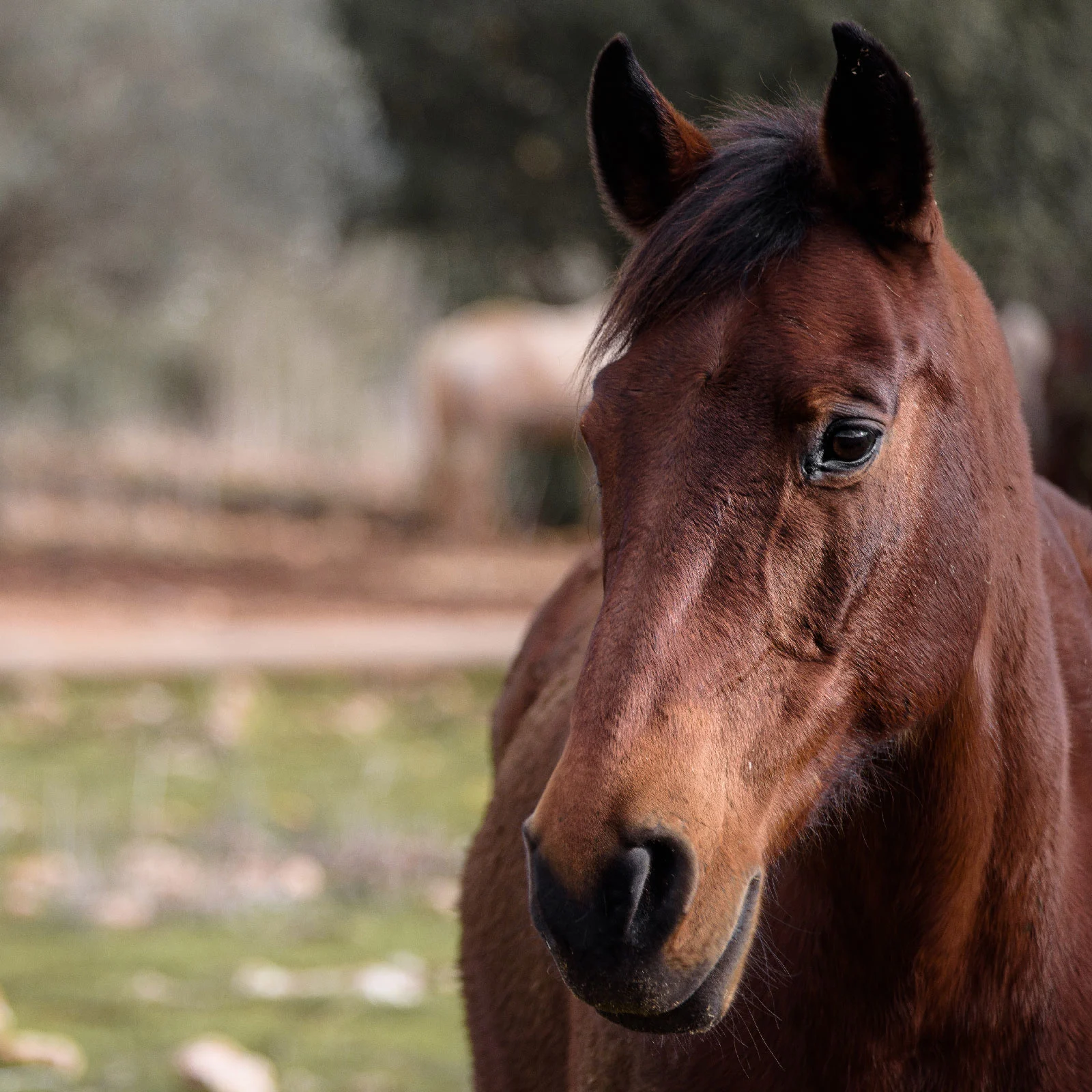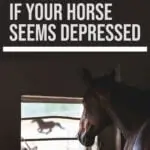Yes, horses can experience feelings similar to depression, but the good news is that there are steps you can take that will help put the pep back in your horse’s steps.
While equine depression is a hotly debated topic, with some people saying that we shouldn’t try to diagnose a horse with ‘human ailments,’ anecdotal evidence from countless equestrians does support the idea that horses have similar mental issues to humans.
In this article, you’ll learn: The signs of equine depression, What causes depression in horses, according to current research, plus how you can help your horse overcome its depression.

Signs of Depression in Horses
There are many signs that your horse is depressed, and it is essential to keep an eye out for these signs to ensure you can treat their depression before it becomes too severe. The signs to look out for include:
Ear Position
Observing your horse’s ear position is a great place to start when trying to figure out the cause of your horse’s depression. In a study published in 2012, researchers observed 59 horses in relation to withdrawn/depressed behaviors and found that ear positions were specific to what the horse was feeling.1 They gave a detailed account of what different ear positions indicated the horse was feeling. See below.
“Discomfort, pain and stress appear to be associated with ears in a backward position.”
Fureix et al., (2012)
🧱🐴 Facing the wall
If your horse is standing in its stall facing the wall for long periods, it may be a sign of depression. They may also be showing withdrawn posture, including having their neck hanging at the same level as their back, not moving their ears, and/or their eyes being open and fixed on one spot.
Missing reactions
If your horse is not responding to external stimuli such as being spoken to or a loud bang from something dropping.
🐎🍰 No interest in treats
If you place treats in your horse’s feed bin and your horse ignores them, there is cause for concern, especially if your horse usually becomes very excited over treats.
They are showing extra emotion
If your horse is responding more emotionally than usual to stressful situations such as being taught a complex trick, it can signal your horse is depressed.
🚫🍪 Change in appetite
If your horse has a sudden change in appetite, it may be feeling unwell or in pain. However, if your horse is uninjured and has no other signs of illness, it can also be a sign of depression.
They avoid other horses
When horses are feeling depressed, they may deliberately avoid socializing with other horses.
🚫💤 They are not sleeping
Horses can have a hard time sleeping when they are depressed. If you notice your horse is sleeping less than usual, you should have your horse checked for any underlying medical issues or depression.
They are getting sick more often
If your horse is usually very healthy and suddenly starts getting numerous infections, it can be a symptom of depression. While getting medical treatment for the infections is essential, you should also treat the depression to prevent future infections.
They’re Reluctant to be Caught in a Pasture
Like humans, when horses are depressed, they don’t want to exercise and they may avoid their owners. If your horse suddenly becomes highly resistant to exercise, it may be a sign of depression. Note that you should also check your horse for any injuries or illnesses.
Causes of Depression in Horses
Just like humans, horses can become depressed for many different reasons. The reasons range from social issues to illness and even boredom. The first step to helping your horse overcome their depression is knowing what is causing it. Below are some of the most common reasons a horse can become depressed.

Illness or Injury: If your horse is unwell or in pain, it may start showing signs of depression
No Social Interaction: Horses are herd animals. If they live alone, they may become depressed from a lack of socializing. One study even found that “anxiety caused by social isolation altered horses’ responses to pain”2
Lack of Exercise: If a horse lacks exercise or pasture time, it may start becoming withdrawn
Stress: High-stress environments may cause depression in horses, and horses used in elite competitions are especially at risk for mental health issues3 – See How Can I Help a Depressed Horse below for tips on reducing your horse’s stress.
Boredom: Horses are active animals and need to be stimulated. That includes physical and mental stimulation.
Harsh training or training methods: Working a horse too hard or using harsh physical punishments can cause depression.
Stressed herd: Horses are pack animals. If one of the other horses is stressed or agitated, the others are likely to follow suit.
How to Help a Depressed Horse
Now that you have identified that your horse has depression, it is time to treat the illness. The exact treatment used will vary depending on what is causing the depression.
To help alleviate your horse’s depression, research indicates that it is a good idea to try and replicate the environment that wild horses are used to.4 This includes:
Find your Horse a Herd
If you only have one horse, your horse may feel lonely. The best way to help loneliness is by purchasing a second horse. If you can’t afford to buy or keep a second horse, you could ask a friend to have their horse move in with yours. Alternately goats and donkeys make great companions and are inexpensive to keep.
Provide a ‘safe’ herd
If another horse is bullying your horse, don’t force them to remain in that horse’s herd. Separating the two horses will make your horse feel safer and help their mood improve.
Allow them to roam
Being cooped up in a stall all the time is not natural for a horse. To keep your stabled horse happy, increase the amount of time they have out in the pasture, allowing them to walk, run and play. If they have to stay indoors due to a harsh climate, consider converting your barn to accommodate shared horse stalls.
Let them graze
Ideally, you should let your horse graze in a pasture as much s possible. If there is no suitable pasture or your stable does not provide turnout time, try using a slow-feed haynet in their stall. This will mimic grazing time in a field and keep them happier in their stall.
Assess their exercise routine
A training regime that is too hard for your horse will cause them to be sore and increase the likelihood of depression. When you create your training schedule, ensure the ground is not too uneven and difficult to navigate. Ensure that it isn’t too hot to be exercising. As a rule of thumb, if it is too hot for you to run comfortably, it is too hot for your horse to exercise.
Finally, make sure your routine matches your horse’s fitness level. If your horse has been resting for 3 or 4 months over winter, don’t start with a 2-hour training session full of jumps and complex routines. You will need to start small and build up their fitness.
Provide entertainment
Let’s be honest, standing in a pasture or stall all day with nothing to do can be boring. Unless they’re on stall rest, horses need mental stimulation to give their mood a boost. Make the pasture or arena fun by giving them a toy. Some great toys include:
- Slow feeders. These are just like the dog treat toys except big enough for a horse.
- Traffic cones. Add a traffic cone or two for your horse to pick up and throw. You will be surprised how long it will keep them entertained.
- 🔴😍🐴 Get them a giant ball! Horses love to play with them! (As a bonus, it is also incredibly entertaining for you to watch!)
- Mud! This one is quite easy to provide. Find a patch of dirt and drench it with water. Not only will your horse like splashing in the water/mud, but they can also roll in it to cool down on a hot summer day.
Final Thoughts on Equine Depression
Depression in horses is a real medical issue and should be taken seriously. A depressed horse may become susceptible to illness, stop interacting with its environment, and refuse to work with its handler. For the health and wellbeing of your horse, it is essential to identify what is causing the depression and rectify the issue as quickly as possible.
- Fureix, C., Jego, P., Henry, S., Lansade, L., & Hausberger, M. (2012). Towards an ethological animal model of depression? A study on horses. PloS one, 7(6), e39280. [↩]
- Reid, K., Rogers, C. W., Gronqvist, G., Gee, E. K., & Bolwell, C. F. (2017). Anxiety and pain in horses measured by heart rate variability and behavior. Journal of Veterinary Behavior, 22, 1-6. [↩]
- Henderson, A. J. (2007). Don’t fence me in: managing psychological well being for elite performance horses. Journal of Applied Animal Welfare Science, 10(4), 309-329. [↩]
- Henderson, A. J. (2007). Don’t fence me in: managing psychological well being for elite performance horses. Journal of Applied Animal Welfare Science, 10(4), 309-329. [↩]

